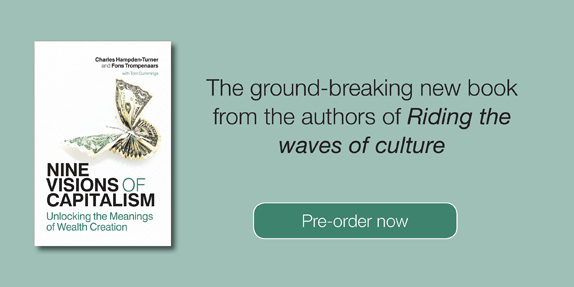On the Total Irrelevance of electoral politics to the UK’s economy and its problems
29 May 2015 by Catherine Holdsworth in Business and finance, Current events, Nine visions of capitalism
By Charles Hampden-Turner, author of Nine visions of capitalism along with Fons Trompenaars and Tom Cummings.
Huge amounts of energy, shouting, amateur dramatics, exaggeration, triumphalism, disastrous disappointment, were featured in the recent election. Reputations were made and shattered, decent people demolished, hopes raised and dashed. Democratic politics substitutes verbal jousting for physical force and that is to the good. Many nations still kill each other. But the verbal fisticuffs need to be relevant to real problems facing the nation and they are not. We need to argue about ideas that might make the economy grow and such ideas are nowhere to be seen. Of course governments take credit for any economic rise and avoid blame for any economic fall, but the truth is that they have not a clue about what to do and recipes are mostly debating points and not solutions. They resemble a man waving his fingers over the keyboard of a player piano where the tune has been punched upon a scroll by unseen hands.
The UK is going to slip ever further behind economically and politicians will continue to turn our milk sour unless they start to face the reality of sagging productivity, chronic under-investment, de-industrialization, the decline of the working class, the stagnation of wages, ever-climbing inequality, growing child poverty and mounting debt, to mention but a few. The “choices” we are asked to make, between more or less government, more of less power of employers over their employees, the extent to which those on welfare should pay for the banking crisis, whether the rich should be further taxed and whether we should exit Europe, has almost nothing to do improving the economy or improving its functions. Politicians are not simply helpless in the face of our economic decline they are part of the problem.
Business is not an adversarial process it is a process of agreement, co-creation, engagement, innovation and forming relationships that generate wealth, so all parties have more money than they began with. There would be no companies if it paid to scratch each other’s eyes out rather than cooperate. We create surplus value through mutual comprehension of each other’s needs and from making provision. Yet politicians trap up is their world of Either/Or, More/Less, Victory/Defeat. Left/Right, Government/Private Enterprise and First-past-the-post or Resign in disgrace.
But of course government is not the enemy of free enterprise, but its impresario, its coach and its cheer-leader. The contracts it offers play a crucial role. Instead of giving ever more power to employers to subdue employees why not favour companies that empower their people? Why not demonstrate that paying people more raises their productivity so that both employee and employer win? There are companies, not many but some, whose employees are engaged, who repay their employers generosity in spades, who have made their work-place meaningful, memorable, innovative and exciting. Why not celebrate these? Why not have them teach us? What does Rolls Royce have that most other industries lack?
We are being overtaken at frightening speed by countries who believe in cooperation rather than conflict, mutual understanding rather than insults, who engage minority views rather than out-voting these, disempowering them and inviting them to oppose. The language of adversarial jousts is antithetical to the growth of enterprise. The crowd out there funds you, it does not howl you down. What can we do about this?
One possible remedy is to take certain issues out of political discourse and create bi-partisan support for them. All politicians need the economy to grow, to create, to innovate, to prosper and for employees to be well not poorly managed. Several Parliamentary Committees have reached common understanding of why manufacturing is important, how supply chains are better managed, how environmental concerns can be turned to profit, how industry around universities like Cambridge can flourish, why on-the-job training and apprenticeships are so important, how women might be more fairly treated, why and how crowd-funding could take off.
These committees meet privately in many cases so they do not need to show off or substitute ideology for thought, or undermine opponents. They are inquiring into matters all of us desire but find hard to generate. Their detailed and agreed recommendations should be above politics. Something that will work because people with diverse views have agreed on them and can bring their workers or their managers to the table to work together.
What about honouring the trade union whose cooperation has contributed most to higher productivity and wealth sharing? What about getting Google to explain how giving employees 20% of their time to follow their own devices, actually increases innovation and that more emerges from that free time than from managed time? Why not fete those who develop free internet products and seek to give gifts to the on-line community? Why do we not thank them publicly? Why are they more creative than paid help? What does this mean for the huge bribes we pay failing bankers? If politicians would start to think and forge cross-party policies we might start to admire them! They might disgust us less.
To find out more about Charles Hampden-Turner and Fons Tromenaars, and their company, please click here.

